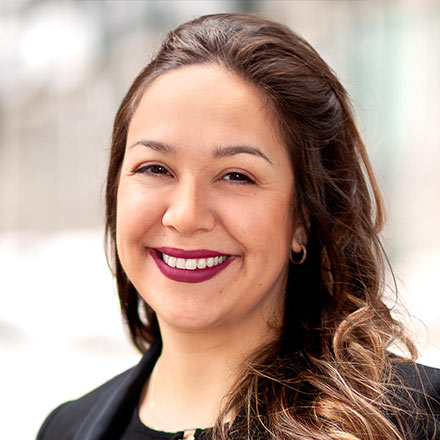Curriculum
Today’s rapidly evolving economy demands leaders who can move ideas from concept to commercialization, navigating uncertainty with creativity, resilience, and strategic insight. Innovators and entrepreneurs must not only identify opportunities but also design viable business models, mobilize resources, and scale ventures that create lasting impact.
The MMIE curriculum combines rigorous academic learning with experiential, hands-on projects to ensure students build both the mindset and skillset needed to launch new ventures or drive innovation within existing organizations. Courses are organized into three integrated areas—Innovation Core, Execution, Financing & Scaling, and Major Projects—to provide students with the tools, frameworks, and real-world practice to transform ideas into thriving enterprises.
Innovation Core
Innovation takes place when an idea is actually launched and commercialized. This course is designed to enable students to apply the tools that take an idea from inception through launch and implementation. It will also discuss how to maintain a culture of innovation in the firm, while applying various systems and tactics to effectively control and manage the development process. Tools such as stage-gate systems, innovation cycles, product life cycles, probability-based estimating and risk assessment are introduced, as we develop some structures around our innovation process, and give the organization the ability to effectively manage a creative business.
This course equips learners with the strategic mindset and design tools to architect digital innovation by integrating linear and systems thinking approaches. While linear thinking emphasizes goal-oriented planning, sequencing, and efficiency, systems thinking enables a holistic understanding of interdependencies, feedback loops, and emergent behavior within complex digital environments. Students will explore how to balance structured problem-solving with adaptive innovation across the innovation lifecycle — from ideation and development to implementation and scale. The course applies both modes of thinking to challenges such as platform design, user experience innovation, and change management. Students will explore case studies that demonstrate how when both thinking approaches are applied, significant benefits emerge such as increased user adoption rates, improved technical feasibility, cost reduction, and revenue generation. Artificial intelligence tools will be used to develop systems (context) maps to provide students with a structured yet modern approach to architecting innovative solutions.
This course examines the implications of digital innovation on people, business and society by exploring a number of examples of how innovative products and services can create harm without due ethical considerations. As innovators, it is imperative that both the benefits and limitations of new innovation be explored. Throughout this course, students will be required to identify and evaluate the ethical underpinnings of design choices, formulate ethical design principles and learn to effectively embed ethical implications into the innovation management lifecycle. Furthermore, while other courses prepare you to unleash your creativity and the possibilities of digital technology in coming up with great digital innovations, this course calls for a reflection on the silent but salient essence of ethical considerations and implications of your design choices. In other words, it is aimed to make you pause and ponder simple but profound questions such as – because we can, should we?
This course introduces students to established and novel practices in designing innovation. Building on the notion that innovation value is derived from a collective set of needs that span across market, business, and user perspectives, students will develop critical thinking skills related to design thinking (outside-in), capability analysis (inside-out)as well as divergent and convergent design cycles. As this is a project course, students will develop these skills using a learn-by-doing approach to clearly define the problem and identify the innovation opportunity. The course will begin by defining the core concepts that underlie each perspective and then students will learn about different methods and techniques used to conduct research and analysis. Once the basics have been covered, the course will transition into an exploration of the tools and frameworks (e.g., jobs-to-be-done, customer journey mapping) that can be used to analyze each perspective as well as how to frame perspectives to identify the opportunity for innovation. Brainstorming and creativity (e.g., Miro) as well as artificial intelligence (e.g., GenAI) tools will be used to provide students with a structured yet modern approach to designing innovation.
Execution, Financing & Scaling
This course provides an overall framework, with which students can begin to understand the elements, and the complex relationships among them, that lead to both entrepreneurial and innovation success. This course is the first in the program, and will serve to introduce specific topic areas that will be covered in greater depth throughout the remainder of the program. The course will be delivered in a concentrated and experiential fashion at the start of the program, so that students can experience the entire innovation context and use it as a first step in further discovering their specific area of focus within the program. Specific topics include: characteristics of successful entrepreneurs and innovators; business model, business case and business plan development; and structures for innovation. Students will apply each of these concepts during the course as they prepare their first new venture/innovation idea to be presented at the end of the course. In essence, this first course is a kickstart boot camp to set up the rest of the program.
This course is designed to provide students with an understanding and appreciation of the role of a sales manager. Topics are covered from the perspective of both a sales manager and a sales person. Specific topics include managing the interplay between the marketing and selling functions, setting and evaluating sales strategy, managing the day-to-day sales functions including recruitment, training, compensation and performance management as well as, the evaluation and control of professional selling methodologies and activities.
The course covers the fundamentals of project management and then dives into advanced concepts such as Traditional and Agile approaches. Students will start by learning how to build business cases to demonstrate the value of technology-driven projects by identifying business needs, setting clear goals, and assessing risks and benefits. This is followed by learning how to turn a solid business case into actionable goals, including defining success criteria and aligning projects with organizational strategies. This module prepares students to lead innovative, technology-focused initiatives with confidence. Students will also learn how to create comprehensive project plans that address resource allocation, risk management, and communication strategies. For Agile projects, you’ll explore tools like user stories, feature prioritization, and iterative planning—skills critical for managing emerging technologies effectively.
This course provides a detailed examination of the venture capital industry across the entire spectrum of investment, ranging from funding initial rounds of “seed” capital all the way to pre- IPO funding of later-stage companies. Real venture capital term sheets from recently completed deals are examined in detail from the perspective of both the investee company and the venture investor. Different investment structures are discussed in detail, and the process of company selection that occurs inside a venture capital fund is examined.
Are you creative? Would you consider your organization innovative? Why or why not? Is creativity necessary in all businesses? Are people born creative or can creativity be taught? The answers to these questions may surprise you. Many people feel that they are not creative but research shows that creativity can be taught. Being a disruptive or new idea entrepreneur also requires being innovative. In the corporate world, most executives agree that their organizations cannot stay the same and survive long term, yet the majority struggle with how to drive ‘Next’ in their business. This course is intended to help develop your creativity skills, identify opportunities for ‘Next’ in an organization, and then manage the innovation and change necessary to bring Next to life - novel new services or products the firm can leverage for increased relationships with existing or new customers. Ultimately, innovation is the responsibility of everyone in the firm, and a core strategy for most companies today, yet some barriers and obstructions keep us from optimizing creativity. In this course, we will try to understand those barriers, and identify leadership tactics.
Major Projects
The key aim of this course is to equip you with the skills and knowledge needed to perform high-quality industry and customer insight research. The course will introduce you to the key components of qualitative and quantitative research methods, discuss tools for strategic industry assessment and support you in building your own how-to toolkit for effective market research.
This capstone course provides students with the opportunity to synthesize and integrate all they have learned in the MMIE program and translate that into a final deliverable customized to fulfill their individual learning objectives for the program. Students will pursue one of four tracks: launch a new venture, scale an existing venture, develop and launch a corporate innovation project or prepare a research report on some aspect of entrepreneurship or innovation. Each student is assigned an advisor who will help guide them through their projects. Course professors work closely with students to guide the development of their final deliverable. Master classes are held throughout the period over which the course occurs, covering practical topics, such as governance, team formation, culture building, all directly related to their project pursuits.
Experiential Learning
The program is highly experiential and “hands-on”. If required for your innovation project, you will have access to design and prototyping Facilities to help turn your ideas into reality. These resources include design studios, prototyping facilities, 3-D printers, wet labs and machine shops.
Meet the Experts
Classes are led by a combination of successful entrepreneurs and outstanding professors from both Smith School of Business and Smith Engineering at Queen’s University. This creates a learning experience that is both practical and relevant. Drawing on their expertise in a broad range of areas from business to design, you will be exposed to leading edge thinking and practice.
View Faculty & InstructorsCoaching and Mentoring
Students in the program will have access to experienced alumni, coaches and project advisors to provide guidance and advice throughout your MMIE journey.
Coaching and career support

“I chose the MMIE program after carefully looking at the entrepreneurship programs across the country. It seemed like the most balanced framework that would allow me to leave with a fully fleshed out business. I already had the idea but wanted to equip myself with the strongest foundations possible to give my business the highest likelihood of succeeding.”